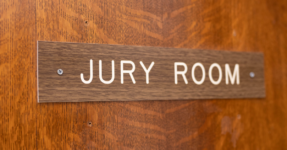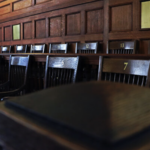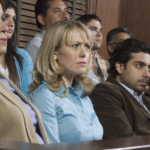Should Juries Be Sequestered More Often in Australia?

The recent mistrial of Bruce Lehrmann, the man accused of sexually assaulting Brittany Higgins in Parliament House, Canberra, has led to debate about whether the jury should have been sequestered – in other words, required to stay at hotels each day after the trial – in order to minimise the risk of exposure to unfairly prejudicial information such as media reports and otherwise inadmissible material.
Quick recap
In case you’re not up with the news, the trial was aborted (cancelled) last month at the jury deliberation stage (ie after all evidence had been presented, closing arguments made and judge’s directions on the law given), because a juror brought a sexual assault research paper downloaded from the internet into the jury room.
That paper was discovered by a sheriff who was tidying up the room after the day’s deliberations.
Juror misconduct
During jury trials, the judge will direct jurors – often at each day’s end – not to consider information or material other than that which has passed the rigors of the laws of evidence and been admitted inside the court room.
In fact in New South Wales, making an inquiry for the purpose of obtaining information about an accused, or any matters relevant to a trial except in the proper exercise of a juror’s function is an offence under section 68C of the Jury Act 1977 which attracts a maximum penalty of 5 years in prison.
Juror independence and misconduct
However in the case of Higgins vs Lehrmann, there were other issues raised prior to the trial actually began relating to the selection of jurors, specifically the Supreme Court’s ability to find 12 truly ‘independent’ jurors who had not been affected by the extensive pre-trial news, commentary and opinion which saturated the media for months in the lead up.
And while Mr Lerhamn’s lawyers were unsuccessful in having the trial permanently stayed (or permanently put off), they were granted a delay in proceedings in order to provide some time for the media coverage and wider community conversations to settle down.
In New South Wales, Mr Lehrmann would have been able to apply for a ‘Judge-Alone’ trial which can go a long way towards solving issues around juror independence and also juror misconduct.
However, in the Australian Captial Territory, the law states that sexual assault trials must be heard by a jury.
Which then in turn brings us back to the question of whether or not the jury should have been sequestered. And whether sequestering jurors should be more of a common practice than it currently is in Australia.
What does ‘sequestering a jury’ mean?
Sequestering jurors is quite common in the United States, especially when it comes to trials covered in the media.
For example, the jurors selected for the Derek Chauvin murder trail (Derek Chauvin is the former police officer, found guilty of killing George Floyed) were sequestered the night before their deliberations were set to begin. While they were closely monitored during the trial itself, they were allowed to return home in the evenings. However, prior to the day when closing arguments were scheduled to be presented in the courtroom, the Judge told the jurors to ‘pack their bags’ and be prepared for extended time away from their families, friends, everyday lives.
In the case of Derek Chauvin, the jury took only ten hours to reach a verdict, finding him guilty of all three charges against him.
However, sometimes juries need much longer to come to an agreement. Sequestering of the jury in the OJ Simpson murder trial in 1995 remains the longest in US history at 265 days, costing the public purse $2 million.
Putting jurors in a bubble
Sequestering a jury means trying to put jurors into a ’bubble’.
This involves accommodating them all together in a hotel or similar venue, where they have minimal contact with the ‘outside world’, including heavily restricted phone and internet access, until the case is finalised by way of a verdict.
This is done to avoid – as much as possible – exposing jurors to outside influence (including discussing the case with their spouse) and any other information not admissible in court. It is also done to protect jurors, particularly in high profile cases – ensuring they cannot be threatened or bribed.
While this is not only costly, it can have a negative psychological impact on jurors, which is a primary reason for sequestering being uncommon in many jurisdictions including Australia.
Another reason is that it may not be possible to completely avoid a person accessing information and material if the wish to do so.
The psychological impact on jurors
During the Bill Cosby sexual assault trial, jurors were sequestered from the very beginning.
However, when deliberations were over and jurors were allowed to go home, many of them did report feelings of isolation and loneliness.
Some said they were impacted by the nature of the allegations and the evidence.
Of course, if these feelings are prolonged, then the potential for stress, anxiety and depression increases, and the impact on mental health could be determined to affect deliberations.
Jurors might begin to engage in conflict, which then affects their ability to openly discuss the case, and reach a consensus.
Some jurors might just agree with everyone else, despite their personal views, in order to reach a quick verdict.
The opposite can also occur – when people are in a group together, alone, focused on a single task for a considerable period of time, and away from their individual lives (which confirm their independence and life choices and ‘who they are’) then what’s called “groupthink” can come into play as jurors begin to get to know each other and forge friendships.
In order to forge relationships they are more likely to agree with each other to appear ‘likable’. Over time, they relinquish the individualism and diversity that is proven to be effective for robust discussion and problem-solving.
In some cases, individual jurors could simply defer to the strongest personalities and the majority view if they don’t feel confident in the role.
Some experts suggest that sequestering jurors – in particular strict curfews, monitored phone calls and generally curtailed independence – can give them a sense of what it might be like to be incarcerated, which makes them more sympathetic to the person on trial.
All of this suggests that there are several risks to sequestering juries, as much as there are risks not to do so.







